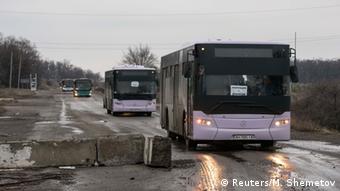Leaders of the Ukraine contact group have announced a ceasefire between rebels and the government in Kyiv. Meanwhile, around 50 tanks entered Ukraine from Russia while the talks were going on, Ukraine's army said.
Leaders from France, Germany, Russia and Ukraine agreed on a ceasefire deal to end 10 months of fighting in eastern Ukraine. The deal is set to go into effect on Sunday.
There were, however, concerns after Kyiv's army reported seeing dozens of tanks and missile launching systems crossing into its territory from Russia even while the peace talks were taking place. "Around 50 tanks, 40 multiple launch rocket systems and a similar number of armored vehicles crossed the Russian-Ukrainian border at Izvarin," Ukraine army spokesman Andriy Lysenko told journalists.
The ceasefire deal
The diplomatic breakthrough came after nearly 17 hours of marathon talks including German Chancellor Angela Merkel, French President Francois Hollande, Russian President Vladimir Putin and Ukraine's President Petro Poroshenko.
Putin told reporters that the agreement called for a ceasefire that would be effective starting Sunday. "It was not the best night in my life, but the morning, I think, is good because we have managed to agree on the main things despite all the difficulties of the negotiations," Putin said.
The deal includes the withdrawal of foreign troops, special status for rebel regions, provisions for border controls and humanitarian issues, the Russian president told journalists. However, he disagreed with Poroshenko on the status of Debaltseve, a strategic railway hub that has been the focus of fierce fighting in the last weeks.
'A relief for Europe'
There were, however, concerns after Kyiv's army reported seeing dozens of tanks and missile launching systems crossing into its territory from Russia even while the peace talks were taking place. "Around 50 tanks, 40 multiple launch rocket systems and a similar number of armored vehicles crossed the Russian-Ukrainian border at Izvarin," Ukraine army spokesman Andriy Lysenko told journalists.
The ceasefire deal
The diplomatic breakthrough came after nearly 17 hours of marathon talks including German Chancellor Angela Merkel, French President Francois Hollande, Russian President Vladimir Putin and Ukraine's President Petro Poroshenko.
Putin told reporters that the agreement called for a ceasefire that would be effective starting Sunday. "It was not the best night in my life, but the morning, I think, is good because we have managed to agree on the main things despite all the difficulties of the negotiations," Putin said.
The deal includes the withdrawal of foreign troops, special status for rebel regions, provisions for border controls and humanitarian issues, the Russian president told journalists. However, he disagreed with Poroshenko on the status of Debaltseve, a strategic railway hub that has been the focus of fierce fighting in the last weeks.
'A relief for Europe'
In a joint statement, the four leaders reaffirmed "their full respect for the sovereignty and territorial integrity of Ukraine" and their belief that there was "no alternative to an exclusively peaceful settlement."
The French president called the deal "a relief for Europe" and said the agreement addresses all issues including those of "decentralization, border control and removal of heavy weapons."
Merkel, however, emphasized that there was "a lot of work to be done." But she also said she was hopeful the situation could be changed for the better. "We have earnest hope for Ukraine and also for Europe," she said.
German Foreign Minister Frank-Walter Steinmeier was restrained about the deal, "We expect that they desist from anything in the especially sensitive phase until the ceasefire comes into effect that could undermine today's agreements."
The four leaders of the Normandy format - the French name for the Ukraine contact group - also decided to establish a monitoring mission to oversee the enforcement of the ceasefire.
The talks, which began in the Belarusian capital of Minsk on Wednesday, were being seen as a last chance to resolve conflict between Kyiv and pro-Russian rebels in eastern Ukraine. Thursday's ceasefire deal was the second agreement after a truce struck in September was largely ignored by both parties.
More than 5,400 people have been killed in fighting between Ukraine's army and pro-Russian rebels in its east. The EU and United States have accused Russia of supporting the separatist rebels, a charge which Moscow denies.
The French president called the deal "a relief for Europe" and said the agreement addresses all issues including those of "decentralization, border control and removal of heavy weapons."
Merkel, however, emphasized that there was "a lot of work to be done." But she also said she was hopeful the situation could be changed for the better. "We have earnest hope for Ukraine and also for Europe," she said.
German Foreign Minister Frank-Walter Steinmeier was restrained about the deal, "We expect that they desist from anything in the especially sensitive phase until the ceasefire comes into effect that could undermine today's agreements."
The four leaders of the Normandy format - the French name for the Ukraine contact group - also decided to establish a monitoring mission to oversee the enforcement of the ceasefire.
The talks, which began in the Belarusian capital of Minsk on Wednesday, were being seen as a last chance to resolve conflict between Kyiv and pro-Russian rebels in eastern Ukraine. Thursday's ceasefire deal was the second agreement after a truce struck in September was largely ignored by both parties.
More than 5,400 people have been killed in fighting between Ukraine's army and pro-Russian rebels in its east. The EU and United States have accused Russia of supporting the separatist rebels, a charge which Moscow denies.


No comments:
Post a Comment